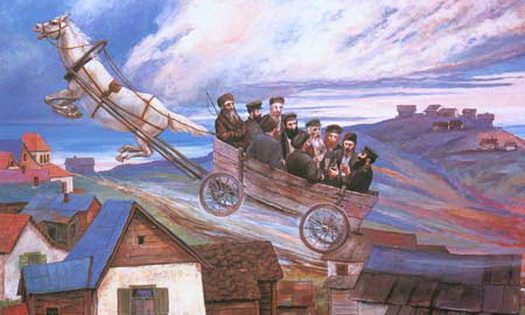
Weekly Story: Chodesh Elul “You Will see That There is Much to Repair!”
by Rabbi Sholom DovBer Avtzon
Concerning last week’s post I was asked, If my parents left Russia on the trains with other Lubavitcher families, how is it that they were the only Lubavitcher there in the DP camp?
Upon their arrival in Poland, my mother was not feeling well, so they remained in Poland as the rest of the Lubavitchers continued on their journey.
Your questions and comments on the weekly story are greatly appreciated. Thank you
It was the beginning of Elul and Reb Levi Yitzchok of Berditchov was learning in his house next to an open window. A handyman was driving his wagon with all of his tools and noticed him, so he took out his horn and blew it to get his attention.
When he saw the master of the house looking at him he asked, “Do you need anything fixed or repaired?”
Reb Levi Yitzchok replied, “Boruch Hashem, all is good, thank you.”
“If you would take a good look,” the handyman replied, “You will see that there is much to repair!”
Hearing these words Reb Levi Yitzchok exclaimed, My Rebbe taught me that everything that happens is hashgacho protis. These words are directed at me for this time of the year.
It is the month of Elul and I am going around as if everything is ok, I am davening and learning properly, I am conducting myself with others properly, and so on, all is good. However, if I will take a careful and honest look at what I am doing, I will see that everything is not so good and that there is plenty I can improve on and fix.
Being that this shabbos is the shloshim of Reb Yoel, I will relate something that isn’t well-known about him. I heard the following from Reb Aharon Chitrik a”h, who was an expert on manuscripts and had many manuscripts of the Rebbeim.
He once received a manuscript of the Rebbe the Tzemach Tzedek and while in general, he understood the maamar, he couldn’t figure out the bottom two lines on the first page, there was simply no continuity from one word to the other. He asked some other chassidim to help him, but there were unable to.
So he took it to Reb Yoel, who after looking at it for ten to fifteen minutes said to Reb Aharon, “If you don’t mind, leave it with me overnight and I will try to figure it out. Reb Aharon happily agreed.”
The next day, Reb Yoel told him, it is simple. These two lines are a kitzur of the entire maamar. He then explained, The Rebbe the Tzemach Tzedek had paper and ink (a feather/pen) on various tables in his house. When a thought came to mind, he would write it down. If however, he didn’t have time to write it completely, so then he would jot down the basic concepts and later on would write it out in its entirety.
Now if you learn the entire maamar here you would see that the first few words of these two lines are mentioned in the first two paragraphs. The following words are discussed in the next few paragraphs and so on.
However, we would all be amiss if we only write about his vast knowledge. Using his own words we will see his greatness is more than that. After reading an article about Reb Shlomo Aharon Kazarnovsky, Reb Yoel said, Yes the writer wrote about his tremendous accomplishments, however, he missed the main quality. Reb Shlomo Aharon was one who lovingly dealt with other people and was loved by all who met him.
The same should be said about Reb Yoel, his greatness in Nigleh and Chassidus isn’t his greatness. His greatness was that he made himself accessible to all that truly wanted to discuss something with him, notwithstanding that the person wasn’t close to his level.
Reb Aharon then told me, from the notebooks of the Tzemach Tzedek you can gain a glimpse of his day. You find a thought on the parsha, then something on gemorah, followed by an answer to a halachah question, followed by an insight in a midrash etc.
He then explained, some people have separate notebooks for different subjects. However, the Tzemach Tzedek had a think notebook and he wrote continuously. So if a thought on the parsha came he wrote it down. If he was studying the gemorah afterward he would write it on the following page, etc etc.
Rabbi Avtzon is a veteran mechanech and the author of numerous books on the Rebbeim and their chassidim. He can be contacted at avtzonbooks@gmail.com
This week’s post is in honor of the birth of a grandson. Mazal tov Mendel and Mushkie. May you have emese chassidishe nachas from him and your other children.













